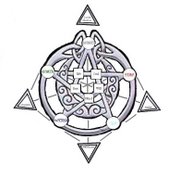Matthew's world is one of power and enchantment - energies that seem to defy all rhyme and reason. From the spells of hermetic mages to the holy miracles of groups like the Order of Michael Archangel, magic is a very real but difficult to quantify part of the setting in which his story takes place.
Magic in his world may be hard to explain or analyze, but that doesn't mean it is entirely an unknown. A few things seem to be constants, or at least predictable enough that they could be considered "laws". Matthew has already learned that such laws can be broken on occasion, but they remain rigid enough to count on (or regret) whenever magical powers are invoked. Spells, it would seem, follow certain guidelines no matter who their casters are.
-------------
Law One: Control is everything. A spell needs to be controlled or the energies will act in unpredictable, often destructive ways. Will is key to working magic. The stronger the mind of the caster, the better their magic.
Law Two: Magic is alive. Spells and magical effects aren't machines and they aren't tools. The power of a spell comes from and is a living entity or perhaps a group of entities. There is a certain level of consciousness to the world itself and when one works magic, they touch that force and must contend with its wishes.
Law Three: Spellcasters are not created equal. It's a fine, noble dream to say that everyone is the same and bears the same personal worth. The truth when it comes to magic is that some people have more of a gift for spell work than others. Their talents can also lie in different forms of power; one mage might be very attuned to spells involving storms and weather while another is a fire mage with few equals. Conversely, there are many, many people in the world with the magical potential of a brick.
Law Four: The force of a spell is equal to talent plus emotion minus resistance. Almost a simple, straightforward equation, magic can be expressed as personal power and intensity combining to overcome resistances of many sorts. Some are external, such as a target's willpower or the structural integrity of a building. Others are internal, like doubt, conflicting feelings, or mental blocks. For example, fear of fire would greatly reduce or even completely negate a mage's ability to manipulate flames.
Law Five: When in doubt, do it yourself. This law expresses the tendency of the consciousness that is magic to be the least helpful when the spell being cast is unnecessary. If a mage works a spell to open a door he could easily walk across the room and turn the knob by hand, the power behind that spell will be weak or may not come at all. If a mage doesn't have a direct need for a spell to work, it is far less likely to do so. It is for this reason that flashy, pointless magic isn't seen in the world; the Power simply won't express itself through such useless displays.
Law Six: Ignorance is more than bliss; it's body armor. Mundanes (people without magical training who have not accepted that the Power is real) have a built-in resistance level to magic that generally exceeds any defense mages can generate through their spells. Denial is a powerful force; mundanes innately believe that magic is not real. Therefore, to them, it usually lacks the ability to affect them.
----------
There are other rules, but these six guide much of the interaction between magic and the "real world" of these stories. As other important things come up in the tales, they will be documented here for your information.
Subscribe to:
Post Comments (Atom)

1 comment:
Thank you for the backgrounding! That will help the reader understand why certain things happen the way they do.
Post a Comment